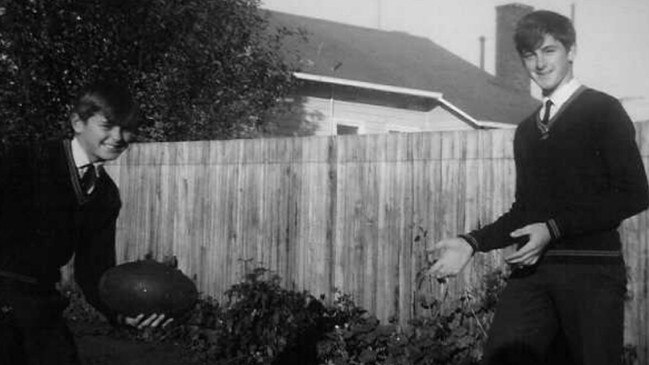
For a full season, twice weekly, I participated in every training session. I ran, tackled and marked; I did everything the older boys were doing. I never expected to be picked for the team, I was just happy to be there.
And then late in the season, just before the finals, the coach announced me as one of two “emergency” players. In Aussie rules parlance, at that time, “emergency” was the equivalent of not quite making it to the substitute’s bench. Still, I was overjoyed: I had technically made the team. More than half a century later I still remember my elation on that night.
Some might cite this as evidence of persistence paying off. I see it differently. I was there because I was inspired by my brother’s athleticism and football prowess. I wanted to be as good as him – to prove myself to him.
Very sadly, Robert’s football career would be cut short in his early twenties. As an adult he could never hold down a job, maintain a relationship or settle in one place. His wanderings worried all those who knew and loved him. At the age of 24 Robert was diagnosed with schizophrenia; he died of a particularly aggressive pancreatic cancer at 47.
Fast-forward to the late 1990s. I was in a Melbourne boardroom for an annual performance review with my boss. He leaned forward and (I am sure in a well-meaning kind of way) said: “Bernard, you need to let go of the demographics thing. It’ll never get you anywhere.” And to be fair, it was a reasonable assessment. I had no columns; I didn’t know anything of the speaking circuit; I hadn’t considered writing a book. All of that and more would unfold years into the future.
I politely heard him out and left the room more determined than ever to persist with “the demographics thing”. Not because I thought it would lead to any kind of success, but because I liked what I was doing – and I couldn’t see anyone else offering my kind of commentary.

I walked out of that boardroom resolved to accept my fate. If my chosen career did indeed lead to professional frustration and penury, then so be it. I liked what I was doing; I thought I was good at it and I looked forward to work every day (I still do). About a year later I was approached by a publisher to write a book, and a year after that the head of a speaking agency turned up in my office “for a bit of a chat”. And the rest is history, as they say.
Over the past 20 years, while speaking at corporate events, I have often been told that I am very passionate. I say, “Am I? It feels normal to me.” All this happened because I had the confidence to follow my passion.
So here’s my advice to any young person starting their working life. Be the best you can be. Draw inspiration from those you admire. Find a career path that aligns with what interests you. Develop, or at least think about, some kind of grand vision – we all need a purpose, a sense that we’re making a difference. Never give up. And never be dissuaded by the advice of well-meaning but misguided mentors and bosses.








At the age of 12, in 1969, I tagged along with my brother to football training. Robert was three years older and captain of the Terang Under-16s football team. He was a gifted athlete. He really could have been a champion.